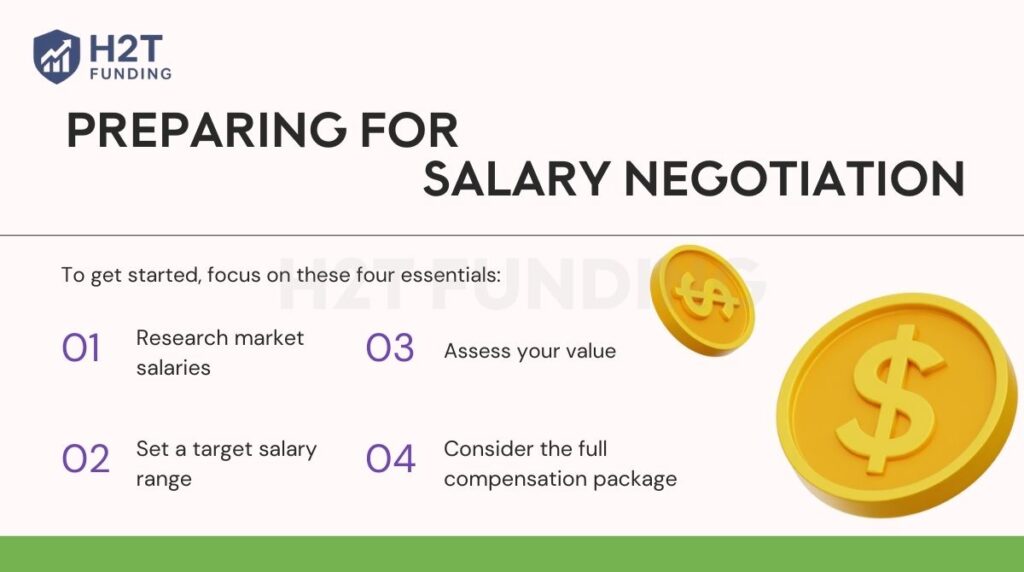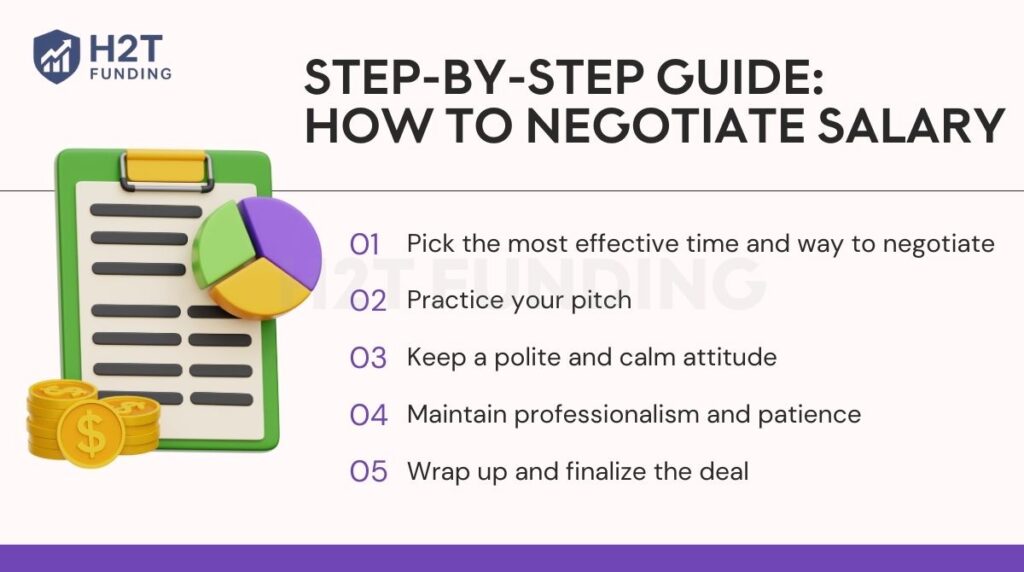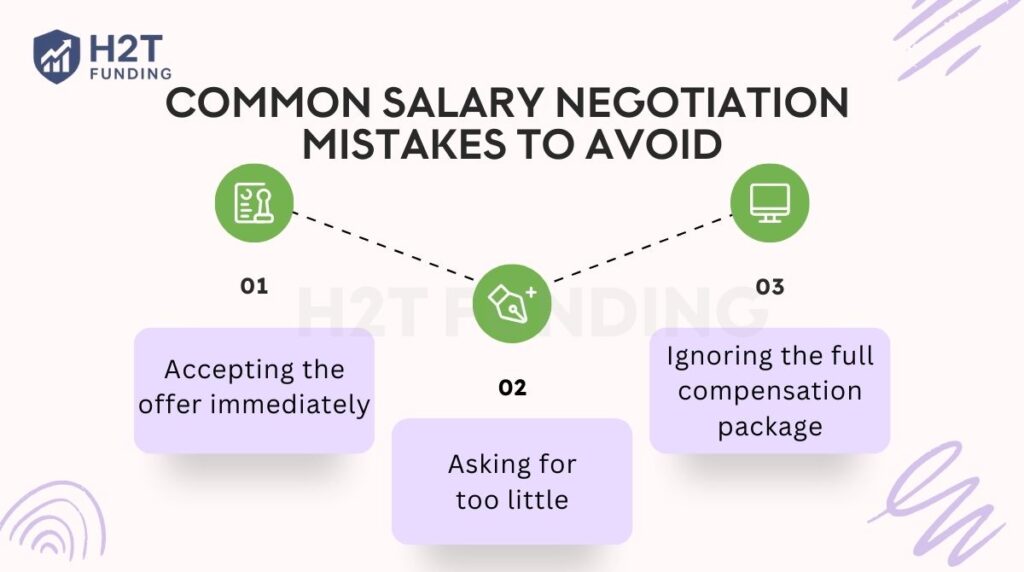Many professionals struggle with how to negotiate for salary during their job search, especially when balancing confidence with likability.
Whether you’re accepting a new job or seeking a raise in your current role, knowing how to negotiate salary effectively is essential. It can lead to better compensation, increased confidence, and long-term career growth.
In this step-by-step guide, H2T Funding walks you through practical steps to help you navigate the salary negotiation process and aim for the compensation you’ve earned.
Key takeaways
- Salary negotiation is essential to ensure fair compensation and long-term financial growth.
- Preparation through market research and self-assessment builds confidence and credibility.
- The best time to negotiate is after receiving a job offer or following proven achievements.
- Professionalism and patience greatly increase your chances of success.
- Learning how to negotiate the salary effectively empowers you to secure better opportunities.
1. Why should you negotiate your salary?
Negotiating your salary is not just an option; it’s a critical step to ensure you’re fairly compensated. Many job seekers hesitate, fearing it might seem pushy, but negotiation is a standard part of the hiring process. Here’s why you should confidently negotiate your salary after a job offer:

- Employers expect negotiation: In 2026, a Robert Half survey found that 73% of U.S. employers anticipate candidates will negotiate their salary. By engaging in this process, you align with their expectations and show confidence in your worth. Handled poorly, though, pushing too far with ultimatums or ignoring company constraints could risk having an offer rescinded.
- Long-term financial goals impact: A modest $5,000 annual salary increase can significantly boost your lifetime earnings. Over a 20-year career, this could add tens of thousands of dollars, especially with raises and promotions. Negotiating a higher salary now pays dividends later.
- Aligning pay with your value: Negotiation ensures your salary reflects your skills, experience, and market rates. By researching industry standards and presenting your achievements, you can secure a fair offer. This process highlights your value to employers.
Taking the time to negotiate demonstrates professionalism and maximizes your earning potential. From my own experience, I’ve seen how preparation can make a big difference. Researching market rates and practicing phrases like “Could we explore a salary that better reflects my experience?” often lead to better pay and greater workplace respect. Don’t miss the opportunity to advocate for the compensation you deserve.
2. Preparing for salary negotiation
Being effective at how to negotiate salary starts with thorough preparation. By researching market rates and assessing your value, you’re not just hoping for a better offer; you’re building a solid, fact-based case for the compensation you’re targeting.
For a stronger foundation in financial decision-making, check out these financial literacy tips for beginners.
To get started, focus on these four essentials:
- Research market salaries
- Assess your value
- Set a target salary range
- Consider the full compensation package
Continue reading to put each of these into action.

2.1. Research market salaries
Before entering any negotiation, it’s crucial to understand what professionals in similar roles are earning in your industry, region, and level of experience. This helps you set a realistic salary expectation, one that is competitive, yet reasonable for the employer.
Effective ways to research the market rate:
- Use trusted salary comparison tools like the Michael Page Salary Comparison Tool to get role-specific and location-specific data.
- Cross-check salary guides from at least three different recruitment agencies to get a more accurate range, as data can vary.
- Browse job listings for similar positions; many now include salary ranges and benefits, giving you additional context.
- Be cautious when using crowd-sourced salary websites; they can offer a ballpark figure, but the data may be outdated or inconsistent.
- Speak with recruitment consultants who understand your industry. They can offer valuable insights and up-to-date salary trends. If you work through an agency, you should also learn how to negotiate salary with recruiter to maximize your benefits.
2.2. Assess your value
Your value in the job market is more than just your current title; it includes your skills, achievements, and the unique contributions you can bring to the company.
Tips to assess your value:
- Identify transferable skills that go beyond the job description, such as leadership, cross-functional collaboration, or niche technical knowledge.
- Quantify your impact with specific results, for example, “increased revenue by 20%” or “cut processing time by 30%.”
- Highlight any specialized expertise that’s rare but in demand within your industry.
Example: If you’re a Marketing Manager who led a digital campaign that boosted conversion rates by 25%, that measurable success can justify negotiating for a salary at the higher end of the market range.
2.3. Set a target salary range
Once you’ve done your research and evaluated your professional value, define a realistic salary range to bring into the negotiation. This range should reflect your minimum acceptable salary, your ideal target, and the upper end you would consider a stretch goal, still grounded in market data.
Tips for setting your salary range:
- Use the market research as your baseline and position your ideal salary slightly above the midpoint, especially if you bring additional value.
- Keep your bottom line in mind, and know the lowest salary you’d accept before walking away.
- Remain negotiable, but don’t settle for less than you deserve. A well-justified salary range shows you’ve done your homework and opens the door to a more constructive discussion.
Example: If your research shows a typical salary range of $60,000–$75,000 for your role, and you have specialized experience or strong results to showcase, it’s reasonable to set your personal range at $68,000–$78,000. Knowing how to negotiate salary in this stage can strengthen your position against competition in the job market.
2.4. Consider the full compensation package
Think of salary as one piece of the complete employment deal. A comprehensive compensation package can include a variety of valuable perks that significantly enhance your total rewards, and may sometimes compensate for a slightly lower base pay.
Assess more than just your salary:
- Bonuses: Are there performance bonuses, sign-on bonuses, or annual incentives?
- Benefits: Health insurance, dental and vision coverage, retirement plans, and wellness programs all have monetary value.
- Paid time off: Generous vacation days, sick leave, and personal time contribute to your work-life balance.
- Career growth opportunities: Funding for professional development, training, or clear pathways to promotion can be long-term investments in your career.
- Work flexibility: Options like hybrid or remote work and flexible hours can add significant lifestyle value.
Tip: If the base salary is non-negotiable, consider negotiating for extras such as more vacation time, a higher bonus, or support for further education.
See more related articles:
3. Step-by-step Guide: How to negotiate salary
Learning how to negotiate salary effectively requires a strategic approach after thorough preparation. Now that you’ve researched market rates and identified your value, it’s time to navigate the negotiation process itself.
Here are the key steps to guide you through the process:
- Step 1: Pick the most effective time and way to negotiate
- Step 2: Practice your pitch
- Step 3: Keep a polite and calm attitude
- Step 4: Maintain professionalism and patience
- Step 5: Wrap up and finalize the deal
Let’s dive into each step in the sections below to see how you can apply them effectively.

3.1. Pick the most effective time and way to negotiate
The right timing can influence how your proposal is perceived. Choose a moment when your manager is less likely to be stressed or distracted and when your recent contributions are fresh and visible.
Best times to consider:
- Following a significant contribution or formal evaluation.
- When the company has posted strong financial results or received funding.
- After receiving a job offer or before signing the contract. This is also the ideal moment to apply a strategy on how to negotiate a salary for a new job to secure a fair starting point.
3.2. Practice your pitch
Going into the negotiation unprepared can lead to uncertainty or a weak case. Prepare a concise, confident pitch that highlights your research and value.
How to craft your pitch:
- Open with appreciation for the offer or opportunity.
- Communicate your expected salary or range with clarity.
- Support your ask with brief, compelling examples of your value (e.g., “I’ve successfully led three cross-department projects that exceeded KPIs”).
- Be respectful, not confrontational. It’s a conversation, not a demand.
- Be mindful of anchoring your number too low, as it may weaken your justification during discussions.
3.3. Keep a polite and calm attitude
Be ready for various outcomes. Your employer may agree, counter with a different figure, or delay the decision. Preparing for each response will help you stay composed.
Tips:
- If offered a lower number, ask for clarification: “Can you share how that figure was determined?”.
- If the company can’t meet your salary request, pivot to discuss benefits or other elements of the package.
- Always ask for time to consider an offer, especially if it’s unexpected or lower than anticipated.
- Sometimes silence works in your favor; pause confidently instead of rushing to fill gaps.
3.4. Maintain professionalism and patience
Stay calm, patient, and avoid arguments or showing negative emotions throughout the negotiation. Emotional control helps you maintain a professional image and increases your chances of success.
If the employer needs time to decide, suggest scheduling a follow-up discussion and always express enthusiasm and willingness to collaborate.
3.5. Wrap up and finalize the deal
Once you reach an agreement, send a confirmation email or written document summarizing the agreed terms to avoid misunderstandings later.
If the offer does not meet your minimum requirements, carefully consider whether to accept or decline. Sometimes declining an unsuitable offer opens the door to better opportunities.
4. Examples from actual salary negotiations
Negotiating salary can feel intimidating, but real-world examples and practical templates can empower you to communicate your value with confidence. From my own experience, below is a how-to negotiate salary example you can adapt to your own situation.
I’ve crafted two templates, one for email negotiation and one for in-person discussions, that you can adapt to your situation. When I prepared thoroughly for negotiations, the results were transformative.
In a previous negotiation for a marketing role, I received an initial offer of $68,000. My research showed the market rate was closer to the mid-$70s.
Instead of simply asking for more, I tied my counteroffer to a concrete result: Based on my experience, including a project that boosted social engagement by 35%, I believe $75,000 better reflects the value I bring. Linking the request to measurable achievements made the difference, and we agreed on that figure.
4.1. Sample salary negotiation email
If you prefer to start the conversation over email, it’s important to be polite and professional. Show your enthusiasm for the role, and justify your salary request with your experience and achievements. You can refer to this example:

Hi [Hiring Manager’s Name],
Thank you very much for offering me the [Job Title] position at [Company Name]. I am excited about the possibility of contributing to your team and believe my skills and experience will add significant value.
Upon reviewing the proposal, I’d appreciate a conversation around the compensation. Given my [number] years of experience in [your field], including achievements like [briefly mention a relevant accomplishment], I am looking for a salary in the range of [$X to $Y]. I believe this range better reflects the market rate and the expertise I bring.
I look forward to discussing this with you and finding a compensation package that works well for both of us.
Best regards,
[Your Name]
4.2. Sample in-person negotiation script
When negotiating face-to-face or over the phone, it’s helpful to keep the tone positive, express appreciation, and clearly state your salary expectations while showing openness to discussion. For instance, if you’re wondering how to negotiate salary over the phone, you can modify the following example:
I truly appreciate the offer. I’m really excited about this role and confident I can contribute to the team’s success. Considering my background, such as [mention a specific result or skill], and the current market salary for similar roles, I was hoping we could discuss a salary closer to $X.
I’m happy to explore other parts of the compensation package as well, such as bonuses or additional benefits, to reach a mutually agreeable arrangement.
These examples are designed to help you approach salary discussions professionally and confidently. Feel free to personalize the language and figures based on your experience and industry.
5. Tips for negotiating a salary to be successful
Salary negotiation is a delicate process, and small adjustments in your approach can make a big difference in the outcome. By applying the right strategies, you’ll increase your chances of securing a better offer while maintaining professionalism and respect throughout the discussion.
- When given a salary range: Aim for the higher end of the range if your skills and experience support it. Use your qualifications, achievements, and market research to justify why you deserve the upper tier. Positioning yourself near the top shows confidence while allowing room for negotiation.
- When the employer rejects your salary request, explore alternative benefits that can add value. These may include signing bonuses, relocation assistance, flexible working hours, remote work options, or scheduled performance reviews within six months. If you’re interested in how to negotiate a salary increase, focus on demonstrating your long-term value and propose a clear path for a raise within 6–12 months.
- Don’t forget to include total compensation: When discussing your salary, consider all aspects of your compensation package, including bonuses, health insurance, retirement plans, and other benefits. For example, a $100,000 salary with a 20% bonus and benefits is a notable full package.
- Practice your negotiation pitch: Rehearse your points aloud with someone before the actual negotiation. Practicing helps you feel more confident, refine your wording, and deliver your case naturally.
- Don’t accept the first offer immediately: Ask for 24-48 hours to consider the offer if needed. Taking time to evaluate gives you space to prepare a thoughtful counteroffer or review the entire compensation package.
Successful salary negotiation comes down to preparation, confidence, and flexibility. Know your value, consider the full package, and practice your approach. This way, you can enter the conversation with clarity and leave with an agreement that works for both you and your employer.
6. Common salary negotiation mistakes to avoid
Even with the best preparation, many professionals still make critical mistakes during salary negotiations. Being aware of these pitfalls will help you stay confident, avoid unnecessary setbacks, and secure a more favorable outcome. Here are some of the most common ones to watch out for:

- Accepting the offer immediately: One of the most common mistakes is agreeing to a job offer right away. Even if you are excited about the role, always take 24 to 48 hours to carefully review the offer. This time allows you to consider all aspects of the proposal, compare it with market salaries, and prepare any questions or counteroffers.
- Asking for too little: Many candidates undervalue themselves by asking for a lower salary than they deserve, especially if they haven’t researched the market or fully assessed their skills and achievements. Before negotiating, spend time researching standard salaries in your industry and location, and clearly identify the unique skills and experience you bring to the company.
- Ignoring the full compensation package: Many candidates focus too much on the base pay and overlook additional benefits such as performance bonuses, equity shares, health insurance, paid time off, or flexible working arrangements. These components can significantly increase the total value of your compensation package.
Avoiding these mistakes not only improves your chances of a successful negotiation but also helps you make smarter financial decisions in the long run. For more insights on building a strong financial foundation, check out this guide on saving vs investing pros and cons.
7. Frequently asked questions (FAQs)
Start by expressing gratitude for the offer, then clearly state your desired salary range, supported by your experience and market research. Maintain a polite and professional tone, and invite further discussion to reach a mutually agreed-upon solution.
It’s usually better to wait until you receive a formal offer before negotiating salary. Early interviews focus on assessing fit and qualifications. However, if the interviewer brings up salary, be prepared to discuss your expectations based on research. If you’re wondering how to negotiate salary in an interview, remember to stay tactful and only bring it up once the employer has proposed a range or offer.
If a higher salary isn’t possible, explore alternative benefits such as signing bonuses, flexible work hours, additional vacation days, or a performance review in 6 months to revisit compensation.
Use trusted sources like industry salary surveys, websites such as Glassdoor, Payscale, or LinkedIn Salary Insights, and professional networks to research competitive pay for your position and location.
You can negotiate politely by showing gratitude for the offer first. Then, explain your value with evidence like skills, achievements, or market data. Keep your tone respectful and focus on finding a win-win solution.
A 20% counteroffer can be acceptable if your skills and experience strongly support it. However, in many cases, employers expect a smaller range, around 10–15%. Always back up your request with research and clear reasoning.
Yes, this is the best time to negotiate. Once you have a formal offer, you hold more leverage. Be prepared with your research and know your target range before entering the discussion.
Avoid saying you need the money for personal reasons or that another candidate is getting paid more. Do not accept or reject without thought. Instead, keep the conversation professional and centered on your value and market standards.
8. Conclusion
Learning how to negotiate salary is a practical skill that directly impacts your career and income. Remember, a successful salary negotiation isn’t about winning an argument; it’s about starting a new role feeling that your contributions are properly valued.
At H2T Funding, we’re here to support that journey with trusted resources, career insights, and personal finance tools tailored to your goals. So, take the first step today: research your market rate, refine your pitch, and step into your next negotiation with confidence.
Looking for more ways to grow your income and career? Explore additional tips, guides, and tools at the Strategy Section and Budgeting Strategies of H2T Funding, your partner in financial empowerment. What’s your biggest salary negotiation win? Share with us in the comments!





